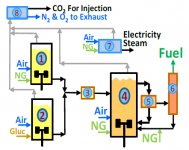Cell-Free Bioconversion of Natural Gas

Technology Description:
GreenLight Biosciences is developing a cell-free bioreactor that can convert large quantities of methane to fuel in one step. This technology integrates biological and chemical processes into a single process by separating and concentrating the biocatalysts from the host microorganisms. This unique “cell-free” approach is anticipated to improve the productivity of the reactor without increasing cost. GreenLight’s system can be erected onsite without the need for massive, costly equipment. The process uses natural gas and wellhead pressure to generate the power needed to run the facility. Any carbon dioxide that is released in the process is captured, condensed and pumped back into the well to maintain reservoir pressure and reduce emissions. This technology could enable a scalable, mobile facility that can be transported to remote natural gas wells as needed.
Potential Impact:
If successful, GreenLight Biosciences’ cell-free bioreactor will enable highly productive mobile methane conversion, allowing access to sources of natural gas regardless of their location for low-cost conversion to liquid fuel.
Security:
An improved bioconversion process could create cost-competitive liquid fuels significantly reducing demand for foreign oil.
Environment:
This technology would allow for utilization of small-scale remote natural gas resources or methane and carbon rich gas residues for fuel production reducing harmful emissions associated with conventional fuel technologies.
Economy:
Expanding U.S. natural gas resources via bioconversion to liquid fuels could contribute tens of billions of dollars to the nation's economy while reducing or stabilizing transport fuel prices.
Contact
ARPA-E Program Director:
Dr. Marc von Keitz
Project Contact:
Dr. Daniel MacEachran
Press and General Inquiries Email:
ARPA-E-Comms@hq.doe.gov
Project Contact Email:
dmaceachran@glbiosciences.com
Partners
University of Michigan
Iowa State University
Related Projects
Release Date:
03/15/2013
